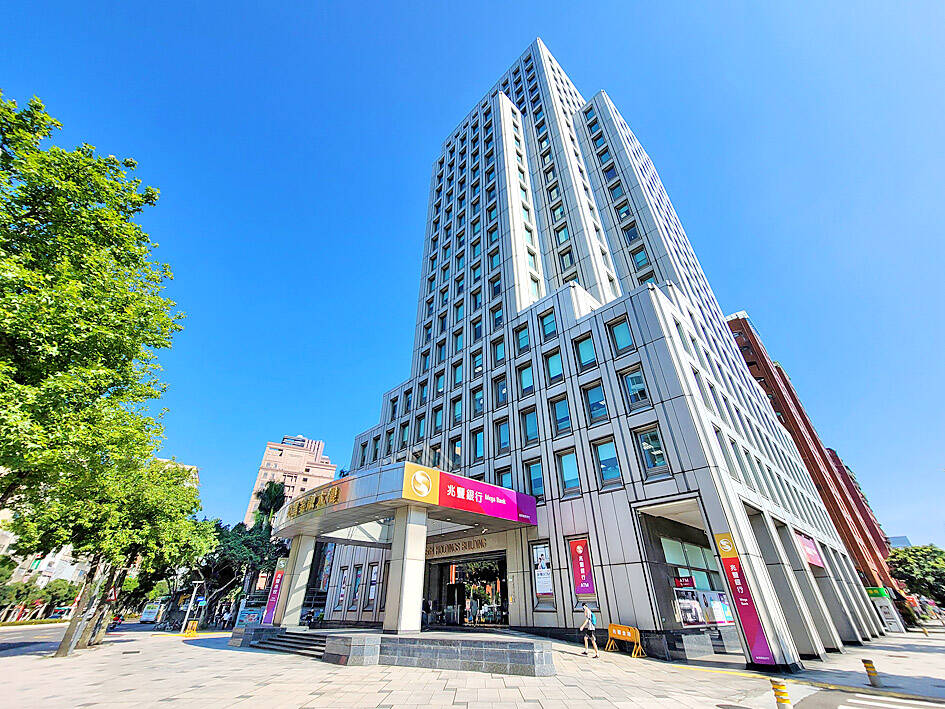State-run Mega Financial Holding Co (兆豐金控) yesterday stood by a 3 percent loan growth target for this year, as monetary tightening, geopolitical tensions and other uncertainty could affect an economic environment that is currently improving.
The bank-focused conglomerate maintained the target even though loan growth already exceeded that aim in the first quarter, with bad loans also picking up at large-cap borrowers, as well as small and medium-sized enterprises.
Net income in the first three months of the year rose 7 percent from a year earlier to NT$11.49 billion (US$355.75 million), or earnings of NT$0.8 per share, making it the most profitable state-run financial institution.

Photo courtesy of Mega Financial Holding Co
“We aim to retain that leadership position by enhancing core operations while pursuing a more balanced development,” Mega Financial president Hsiao Yu-mei (蕭玉美) told an online investors’ conference.
Interest income at its main subsidiary, Mega International Commercial Bank (兆豐銀行), rose 3 percent year-on-year, while fee income soared 82 percent, the group’s financial statements showed.
The improvement came after overall lending expanded 7.3 percent — with loans to large corporations rising 9.9 percent, small and medium-enterprise financing increasing 5.7 percent and mortgage operations gaining 3.7 percent, company data showed.
Mega Bank would press ahead with its emphasis on syndicated loans and international financing while reaching out to first-time homebuyers, officials said.
Foreign-exchange swaps, a major profit driver in the past two years, would slow this year, as the differences in interest rates between Taiwan and the US ease slightly after the central bank in March raised rates 0.125 percentage points, officials said, adding that the gap would drop further if the US Federal Reserve lowers interest rates as widely believed.
The issue poses a big uncertainty given that inflation is becoming sticky in the US, officials said.
With interest rates at high levels, it is difficult to adjust to a favorable lending structure by raising demand deposits and lowering time deposits, officials said.
The brokerage arm Mega Securities Co (兆豐證券) proved a bright spot with a net income of NT$890 million, representing a 91 percent spike from a year earlier.
The impressive showings came amid TAIEX rallies, which inflated the investment portfolio and trading gains, officials said.
Enhancing nonbanking operations fell in line with the group’s effort to diversify its income sources and pursue a more balanced development, Hsiao said.
Mega Financial would raise its stakes in US government bonds to capture benefits linked to interest rate cuts, officials said.
Mega Financial is to distribute NT$1.5 per share in cash dividends and another NT$0.3 in stock dividends from last year’s earnings, making it an attractive and reliable investment target, officials said.
Shares in Mega Financial yesterday shed 2.01 percent to NT$39, deeper than the main board’s 0.9 percent retreat and the financial sector’s 1.76 percent fall, Taiwan Stock Exchange data showed.

STILL HOPEFUL: Delayed payment of NT$5.35 billion from an Indian server client sent its earnings plunging last year, but the firm expects a gradual pickup ahead Asustek Computer Inc (華碩), the world’s No. 5 PC vendor, yesterday reported an 87 percent slump in net profit for last year, dragged by a massive overdue payment from an Indian cloud service provider. The Indian customer has delayed payment totaling NT$5.35 billion (US$162.7 million), Asustek chief financial officer Nick Wu (吳長榮) told an online earnings conference. Asustek shipped servers to India between April and June last year. The customer told Asustek that it is launching multiple fundraising projects and expected to repay the debt in the short term, Wu said. The Indian customer accounted for less than 10 percent to Asustek’s

‘DECENT RESULTS’: The company said it is confident thanks to an improving world economy and uptakes in new wireless and AI technologies, despite US uncertainty Pegatron Corp (和碩) yesterday said it plans to build a new server manufacturing factory in the US this year to address US President Donald Trump’s new tariff policy. That would be the second server production base for Pegatron in addition to the existing facilities in Taoyuan, the iPhone assembler said. Servers are one of the new businesses Pegatron has explored in recent years to develop a more balanced product lineup. “We aim to provide our services from a location in the vicinity of our customers,” Pegatron president and chief executive officer Gary Cheng (鄭光治) told an online earnings conference yesterday. “We

LEAK SOURCE? There would be concern over the possibility of tech leaks if TSMC were to form a joint venture to operate Intel’s factories, an analyst said Taiwan Semiconductor Manufacturing Co (TSMC, 台積電) yesterday stayed mum after a report said that the chipmaker has pitched chip designers Nvidia Corp, Advanced Micro Devices Inc and Broadcom Inc about taking a stake in a joint venture to operate Intel Corp’s factories. Industry sources told the Central News Agency (CNA) that the possibility of TSMC proposing to operate Intel’s wafer fabs is low, as the Taiwanese chipmaker has always focused on its core business. There is also concern over possible technology leaks if TSMC were to form a joint venture to operate Intel’s factories, Concord Securities Co (康和證券) analyst Kerry Huang (黃志祺)

It was late morning and steam was rising from water tanks atop the colorful, but opaque-windowed, “soapland” sex parlors in a historic Tokyo red-light district. Walking through the narrow streets, camera in hand, was Beniko — a former sex worker who is trying to capture the spirit of the area once known as Yoshiwara through photography. “People often talk about this neighborhood having a ‘bad history,’” said Beniko, who goes by her nickname. “But the truth is that through the years people have lived here, made a life here, sometimes struggled to survive. I want to share that reality.” In its mid-17th to